Year 12 (Grade 11) Interrobang!? Inquiry Course @ Blanchelande College
Home › Forums › Inquiry and resource design › Year 12 (Grade 11) Interrobang!? Inquiry Course @ Blanchelande College
- This topic has 9 replies, 1 voice, and was last updated 2 years, 12 months ago by
 Jenny Toerien.
Jenny Toerien.
-
AuthorPosts
-
29th January 2023 at 11:09 am #79583
From September 2022 to October 2022 we ran the first iteration of our Year 12 Inquiry induction course (called Interrobang‽), which led to a Signature Work and celebration evening. In 2021 Darryl had run a very successful Critical Thinking course, which was a great start (particularly given it was our first term at Blanchelande in a brand new Library with a very new Sixth Form and it was tough getting everything off the ground at the same time!). However this year we agreed with the Head of Sixth Form that we wanted a very targeted induction course, equipping the Sixth Form with the inquiry skills and mindset would set them up for Sixth Form life. It was also a springboard for those considering an Extended Project Qualification, with the EPQ course starting as the Interrobang‽ finished.
The compulsory course was six weeks long with a half hour lesson and half an hour of homework every week, and led to a Signature Work poster presentation evening for every student. We combined this with the EPQ presentations to produce our first Sixth Form Inquiry Celebration Evening – which we hope will be a good model for the Year 6 and 9 Signature Work Celebration evenings later this term. All Y12 parents, the parents of the Y13 EPQ students and any interested Y11 students and parents were invited. I will discuss that in a later post.
We called the course (and the Signature Work it led to) Interrobang‽ after a 1960s punctuation mark (‽) used to denote rhetorical questions, but also a sense of wonder and excitement at discovering something new. We talk about it as the What! Why?, to reflect that sense of “Wow, I never knew that! How can I find out more?” that we get when we find out something new that intrigues us. The What! in Interrobang‽ can be linked to Connect (what do I already know?) and the Why? to Wonder (what do I want to find out?).
25th February 2023 at 8:49 am #79673The aim of the course was to equip the students for independent study in the sixth form and to introduce skills that many of them would need on their courses. The expectation was that they would need further support in subject specific contexts when they met these skills again later in their courses, but that everyone would at least be starting from the same firm foundation. In choosing the skills to focus on we were aware of time constraints – 3 hours of instruction with 3 hours of homework to practise – and also of resource limitations. Given we were giving them a completely free choice of topic it was unrealistic to expect them all to be able to use library books (there wasn’t time to buy in any specialist stock to cover gaps in our collection, even if this was practical or desirable for a short term project such as this). We therefore decided to focus on using online resources for the Investigate part of the course.
You can download a copy of the scheme of work here. First page shown in image below.
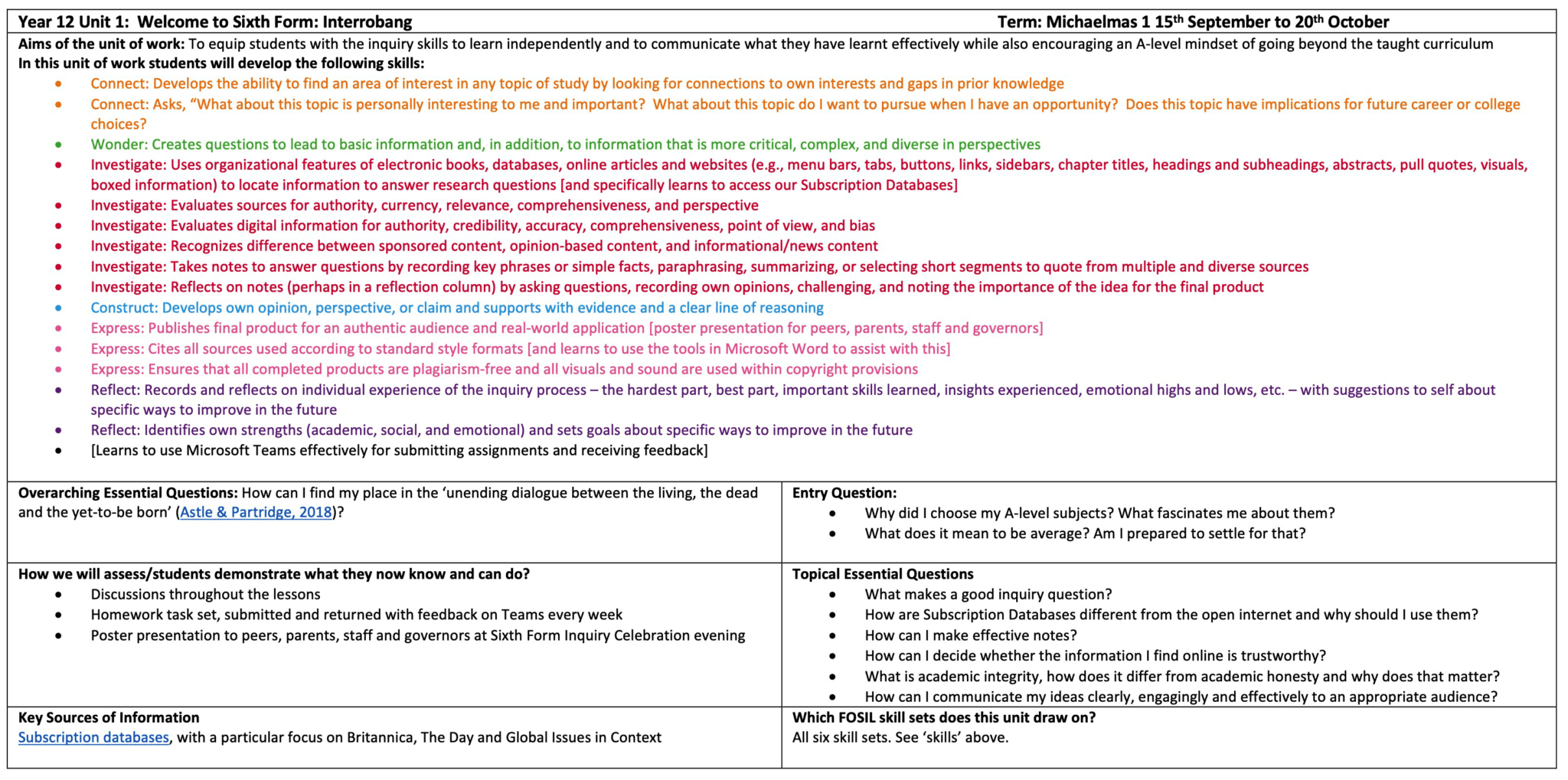
I will post more detail about individual sessions shortly.
25th February 2023 at 9:03 am #79677Session 1: Not the average child
You can download the presentation I used for this session here.
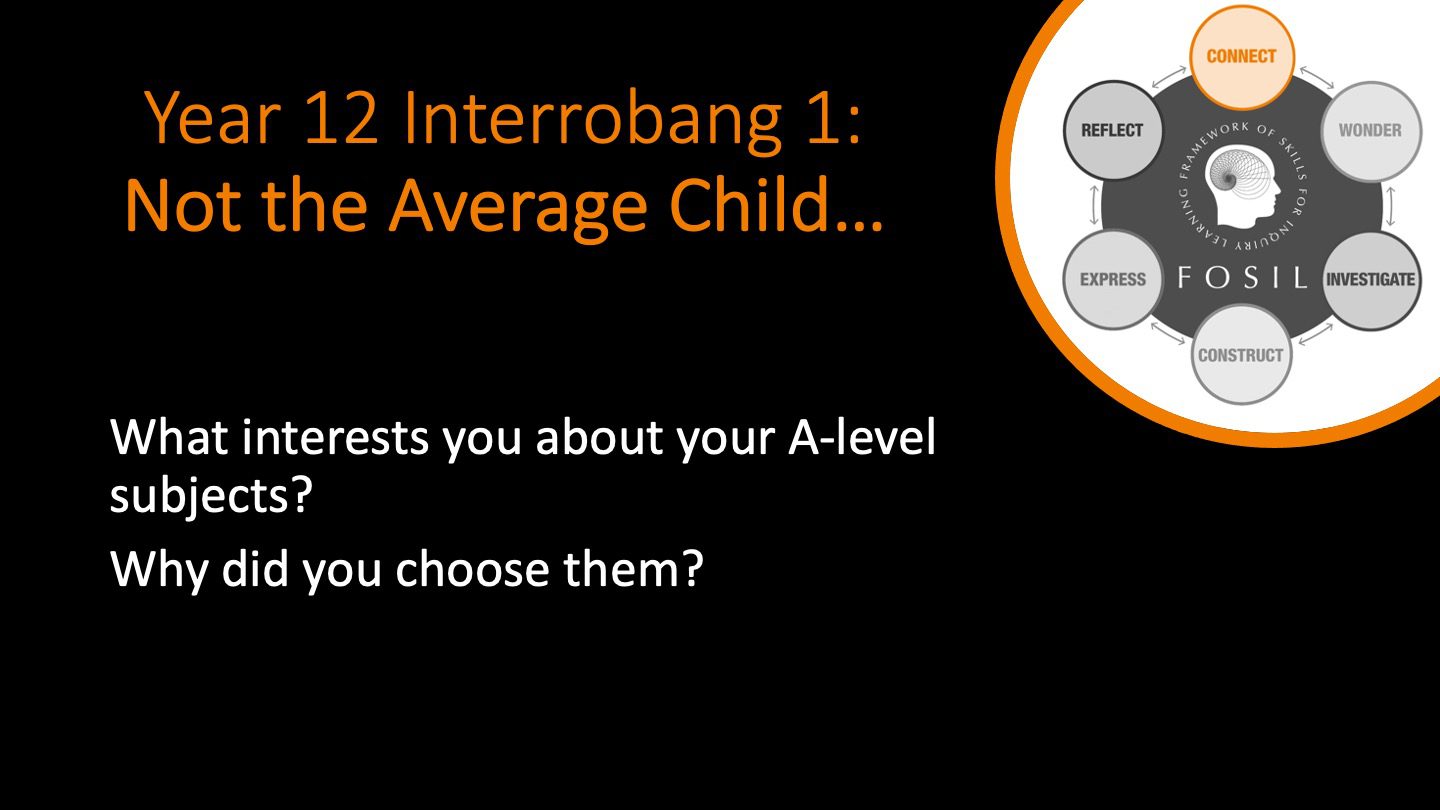
The key aim of this session was to motivate the course and to get students excited ab
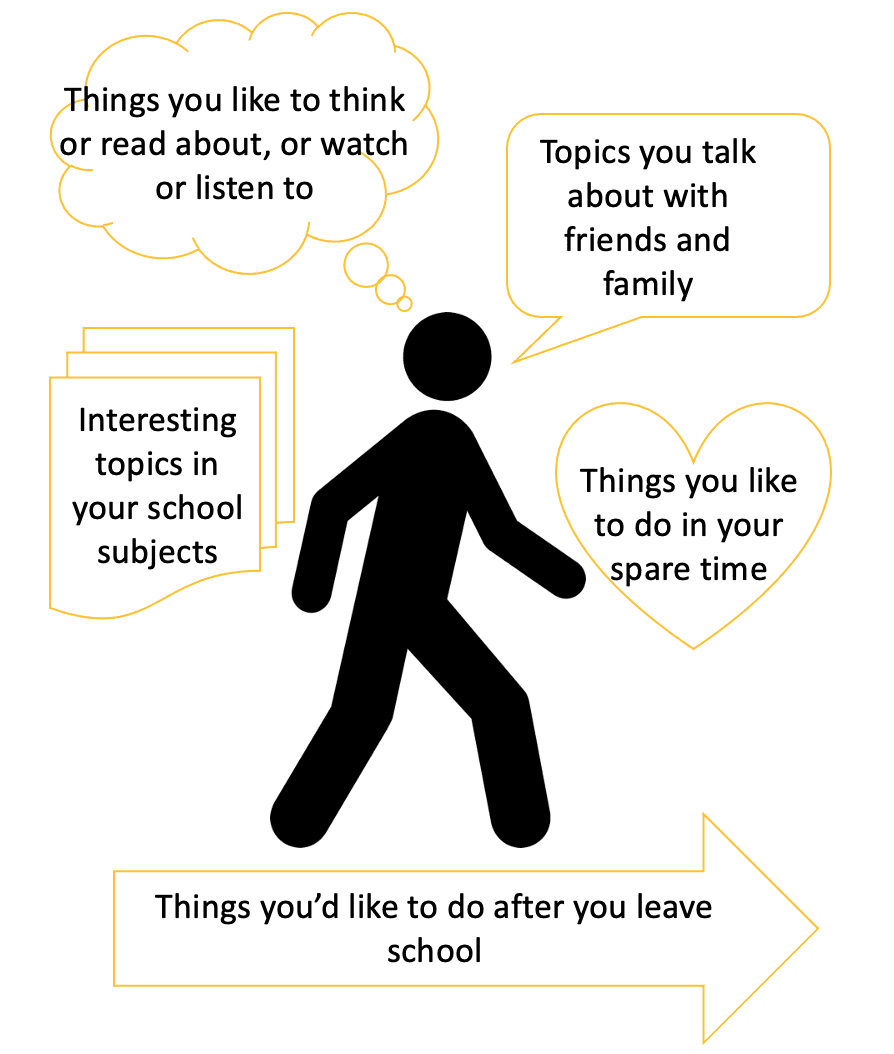 out investigating a topic of their choice. Typically students find having a free choice of topics quite hard – some love it, but many find it paralysing. Before the summer I had had the opportunity to deliver a 30 minute light touch ‘bridging course’ session (part Interrobang, part EPQ) at which we had looked at this image (see right) and they had filled in their own blank version and discussed it with a partner.
out investigating a topic of their choice. Typically students find having a free choice of topics quite hard – some love it, but many find it paralysing. Before the summer I had had the opportunity to deliver a 30 minute light touch ‘bridging course’ session (part Interrobang, part EPQ) at which we had looked at this image (see right) and they had filled in their own blank version and discussed it with a partner.Some therefore already had a clear idea of what they wanted to investigate but others hadn’t given it another thought since July, so to help them to get started I showed them how to browse some of our subscription databases to find topics that interested them. The advantage of this approach was that they would know right from the beginning that there were readily available, reliable sources of information for their topics. It also highlights a vital part of Connect that is often overlooked in shorter inquiries – consulting background information to get an overview of your topic before developing questions and diving in to the Investigate stage (for example, the Grade 7 (Year 6!) continuum skill “Uses multiple sources to acquire background information and identify key words, important people and organizations, and big ideas”.
For homework they needed to come up with an interesting topic and find an article from one of our databases that related to it.
Focus skills for this session:
- Connect: Develops the ability to find an area of interest in any topic of study by looking for connections to own interests and gaps in prior knowledge
- Connect: Asks, “What about this topic is personally interesting to me and important? What about this topic do I want to pursue when I have an opportunity? Does this topic have implications for future career or college choices?
- Investigate: Uses organizational features of electronic books, databases, online articles and websites (e.g., menu bars, tabs, buttons, links, sidebars, chapter titles, headings and subheadings, abstracts, pull quotes, visuals, boxed information) to locate information to answer research questions [and specifically learns to access our Subscription Databases]
- [Learns to use Microsoft Teams effectively for submitting assignments and receiving feedback]
25th February 2023 at 9:26 am #79681Session 2: No such thing as a silly question?
You can download the presentation I used for this session here.
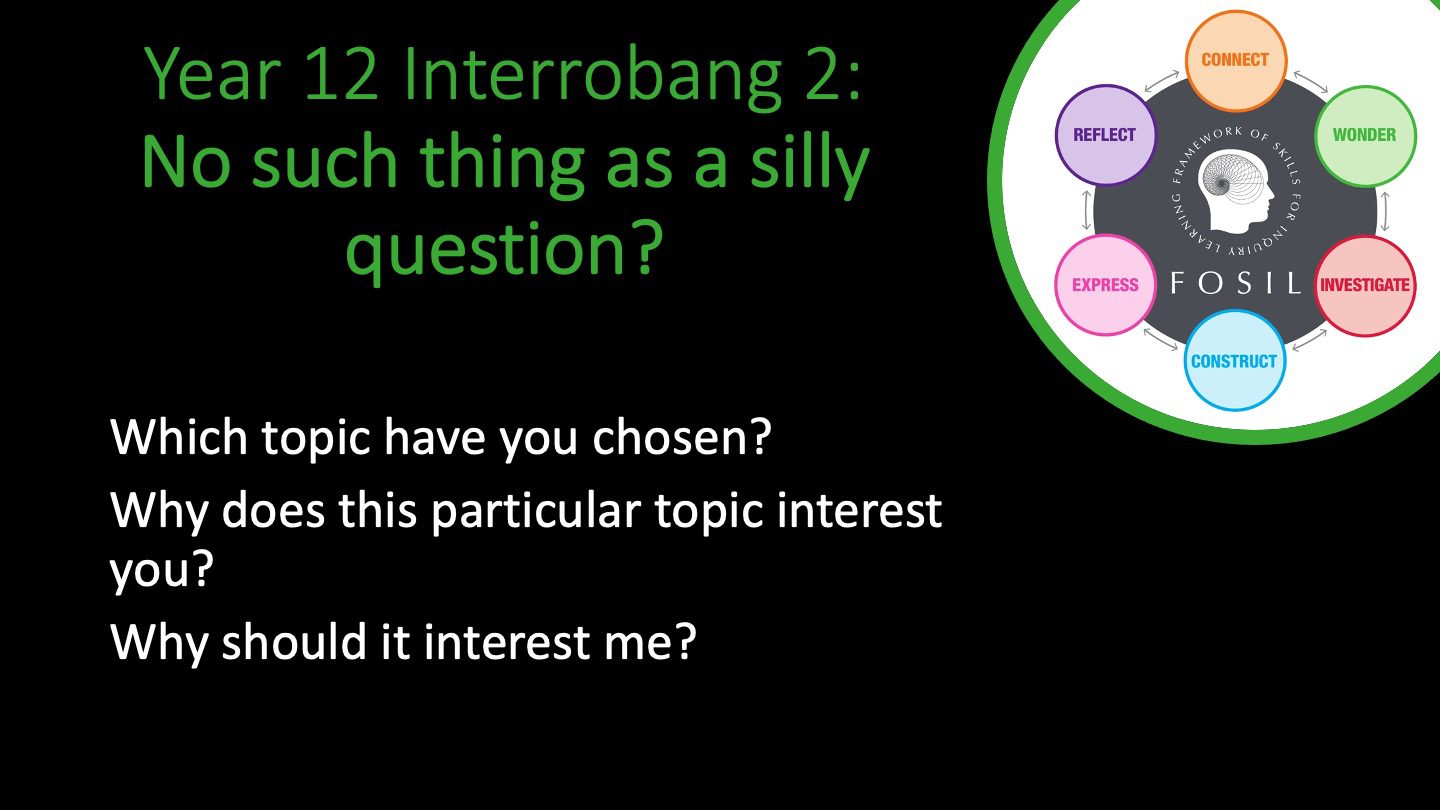
Asking good inquiry questions is hard! Students will often start with easy factual questions (with copy and paste answers) and need to be encouraged to broaden these out into more debatable questions. In this case this was a very short inquiry, which for some would lead to an EPQ, so the idea was to help every student to understand the difference between questions with easy factual answers and more complex and interesting questions and to encourage them to start asking the latter. There was no expectation that they would reach ‘answers’ by the end of the inquiry, but the hope was that their curiosity would be stimulated to want to investigate further.
For homework they needed to come up with a list of questions with easy factual answers and a list that were more matters of opinion relating to their topic, choose a question they were interested in and continue their investigation (using an Investigative Journal).
Focus skills for this session:
- Wonder: Creates questions to lead to basic information and, in addition, to information that is more critical, complex, and diverse in perspectives
- Investigate: Takes notes to answer questions by recording key phrases or simple facts, paraphrasing, summarizing, or selecting short segments to quote from multiple and diverse sources
- Investigate: Reflects on notes (perhaps in a reflection column) by asking questions, recording own opinions, challenging, and noting the importance of the idea for the final product
- Investigate: Uses organizational features of electronic books, databases, online articles and websites (e.g., menu bars, tabs, buttons, links, sidebars, chapter titles, headings and subheadings, abstracts, pull quotes, visuals, boxed information) to locate information to answer research questions [and specifically learns to access our Subscription Databases]
25th February 2023 at 11:51 am #79686Session 3: Cutting the CRAAP
You can download the presentation I used for this session here.
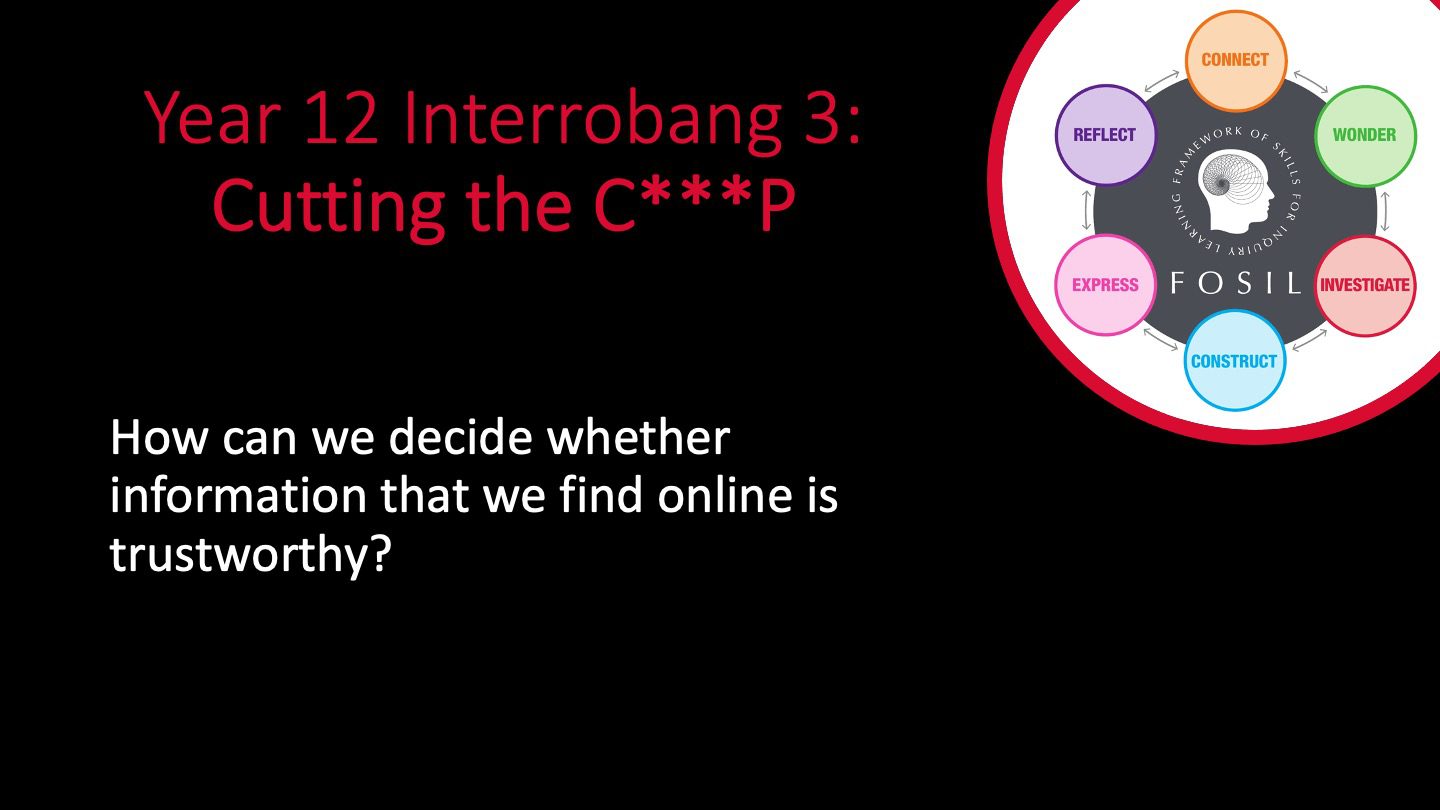 This session was designed to get students broadening their search out to general websites and critically evaluating the sites they found. I based it largely on this CRAAP Testing Presentation that I originally developed four years ago for a Year 9 Chemistry group. It really is a gift that keeps giving, and is a constant reminder to me that if I manage to do something properly the first time (even if it takes a disproportionate amount of time to develop compared to its value in that first use!) it will save me so much time in the long run.
This session was designed to get students broadening their search out to general websites and critically evaluating the sites they found. I based it largely on this CRAAP Testing Presentation that I originally developed four years ago for a Year 9 Chemistry group. It really is a gift that keeps giving, and is a constant reminder to me that if I manage to do something properly the first time (even if it takes a disproportionate amount of time to develop compared to its value in that first use!) it will save me so much time in the long run.Source evaluation is so important and there are many arguments about the best way to teach it (see the forum topic CRAAP and SIFT. Is there something better? and this detailed discussion of the pros and cons of tools like the CRAAP test as part of the forum topic Empowering students to inquire in a digital environment, starting at this post ). I have chosen the CRAAP test, while being fully aware of its limitations. Like inquiry itself, source evaluation isn’t a rote method or checklist but a stance of curiosity and, to an extent, healthy suspicion about the provenance of your information. However, in the same way that the FOSIL cycle and resources scaffold the inquiry process, a ‘checklist’ like CRAAP can scaffold the source evaluation process, which is very challenging when you are new to it because there is so much to consider. Never confuse the scaffolding with the skill being developed. All good scaffolding should be designed to fall away once the skill is secure.
Homework for this lesson was to fully CRAAP test one website to do with their topic and then continue with their investigative journal if they had any time to spare (half an hour isn’t long for a decent CRAAP test, so I wasn’t expecting too much more).
Focus skills for this session:
- Investigate: Evaluates sources for authority, currency, relevance, comprehensiveness, and perspective
- Investigate: Evaluates digital information for authority, credibility, accuracy, comprehensiveness, point of view, and bias
- Investigate: Recognizes difference between sponsored content, opinion-based content, and informational/news content
25th February 2023 at 12:31 pm #79691Session 4: Being part of the conversation
You can download the presentation I used for this session here.
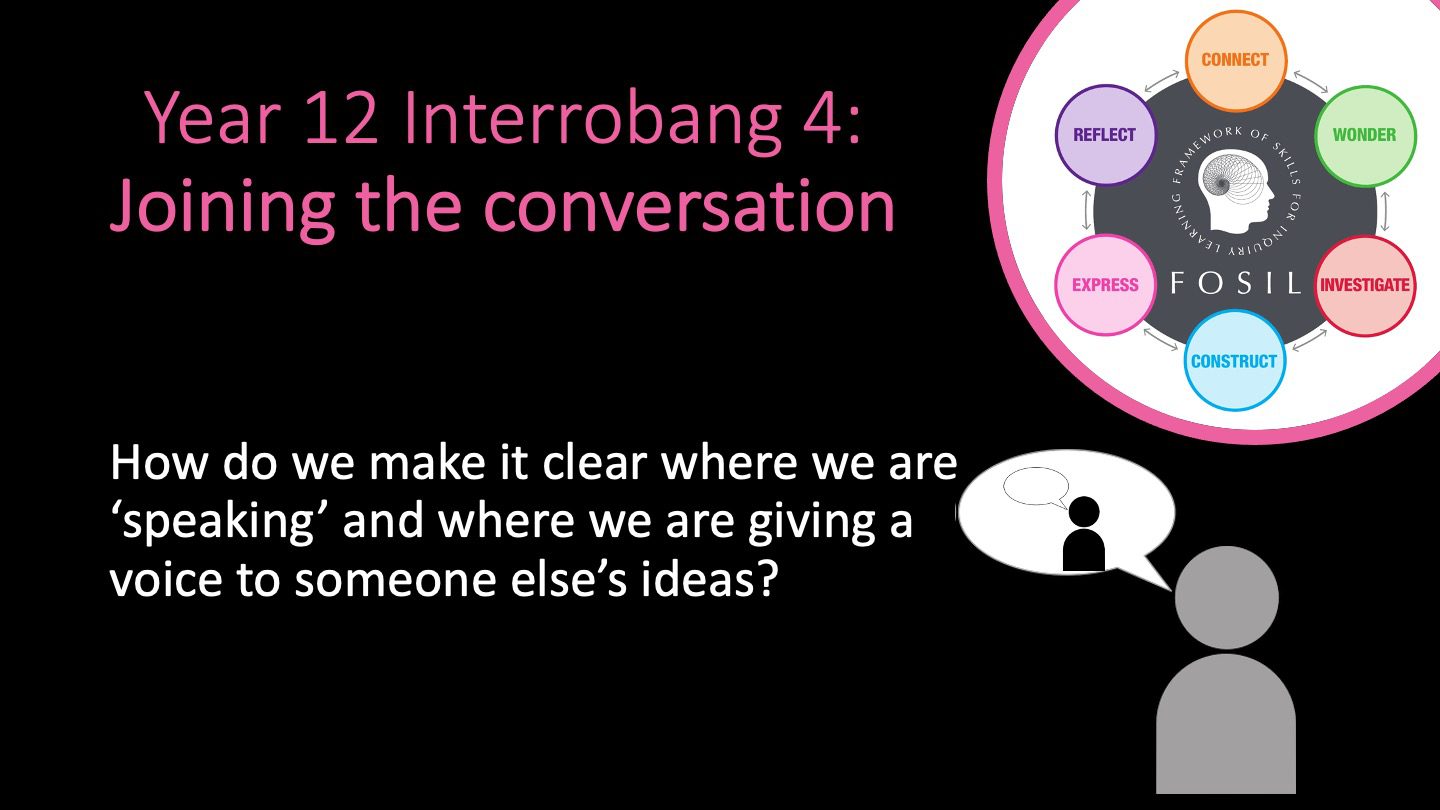
While the skill addressed in this session was citing and referencing, I felt it was vital to focus on the underlying attitudes that make citing and referencing an inevitable necessity rather than an externally imposed burden. I have unashamedly copied the following paragraphs from the article I wrote about this week’s session for the school’s weekly newsletter (which is an important advocacy tool for us as it provides a direct channel of communication with parents):
We talked about finding our voices in ‘the unending dialogue between the living, the dead and the yet-to-be born’ (Astle & Partridge, 2018, p.10) with (academic) integrity. The distinction between academic honesty and academic integrity is an important one, brilliantly explained by John Royce (2020) – ‘[a]cademic integrity is more than the choice of the writer – indeed, it is more, much more, than just about the writer … [it] is doing the right thing because this is you, what you do, who you are, how you behave. Integrity is not having to think about the right course of action, it comes naturally’. We were all agreed that we wanted to be known as men and women of integrity.
One of the first steps is learning how to work honestly with the ideas of others, so we began our journey by learning to use the citing and referencing tools in Word to make our sources clear.
Bibliography
Astle, J., & Partridge, L. (2018). Education for the Enlightenment. In A. Painter, Ideas for a 21st Century Enlightenment (pp. 10-15). London: RSA Action and Research Centre. Retrieved from https://www.thersa.org/reports/ideas-for-a-21st-century-enlightenment
Royce, J. (2020, July 29). The integrity of integrity. Retrieved February 10, 2022, from Honesty, honestly…: https://www.read2live.com/2020 /07/29/the-integrity-of-integrity/
For homework students were asked to produce a bibliography of all the sources they had used so far.
Focus skills for this session:
- Express: Cites all sources used according to standard style formats [and learns to use the tools in Microsoft Word to assist with this]
- Express: Ensures that all completed products are plagiarism-free (
and all visuals and sound are used within copyright provisions– not relevant in this case)
25th February 2023 at 1:15 pm #79695Session 5: The information-to-knowledge journey
You can download the presentation I used for this session here.
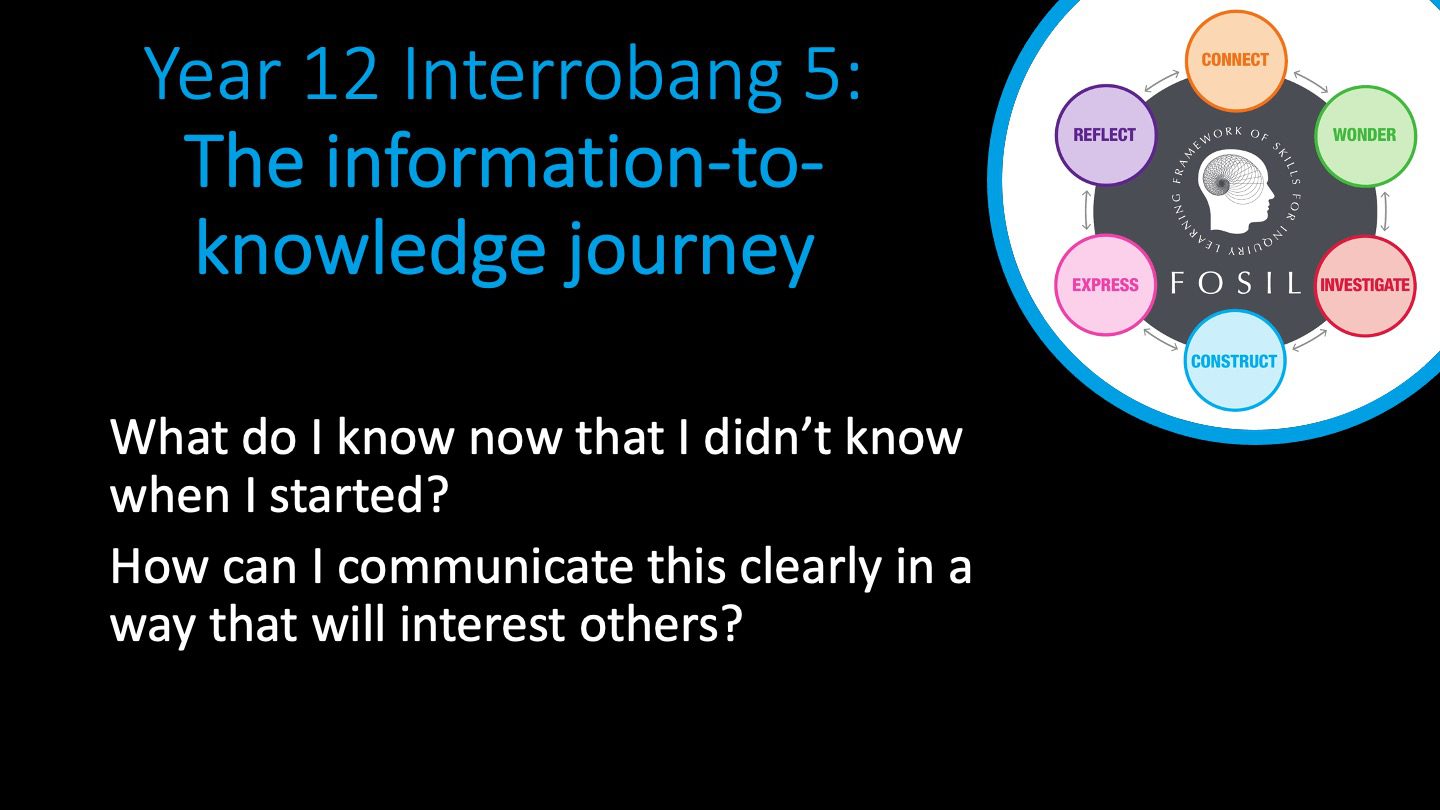 Because this short course was skills and process focussed, most students did not have time to delve very deeply into their chosen topics (it was really largely an extended ‘Connect’ stage, particularly for those who went on to do an EPQ ), which made it difficult to spend much time on constructing understanding from a limited amount of investigation. This was not unexpected – a fair amount of the focus of the course was on Investigate and Express, and we have spoken before about the need to focus on certain stages in an inquiry because, while it is necessary to step through them all for a complete inquiry, it is rare to have the opportunity to spend as much time as we would like on every stage.
Because this short course was skills and process focussed, most students did not have time to delve very deeply into their chosen topics (it was really largely an extended ‘Connect’ stage, particularly for those who went on to do an EPQ ), which made it difficult to spend much time on constructing understanding from a limited amount of investigation. This was not unexpected – a fair amount of the focus of the course was on Investigate and Express, and we have spoken before about the need to focus on certain stages in an inquiry because, while it is necessary to step through them all for a complete inquiry, it is rare to have the opportunity to spend as much time as we would like on every stage.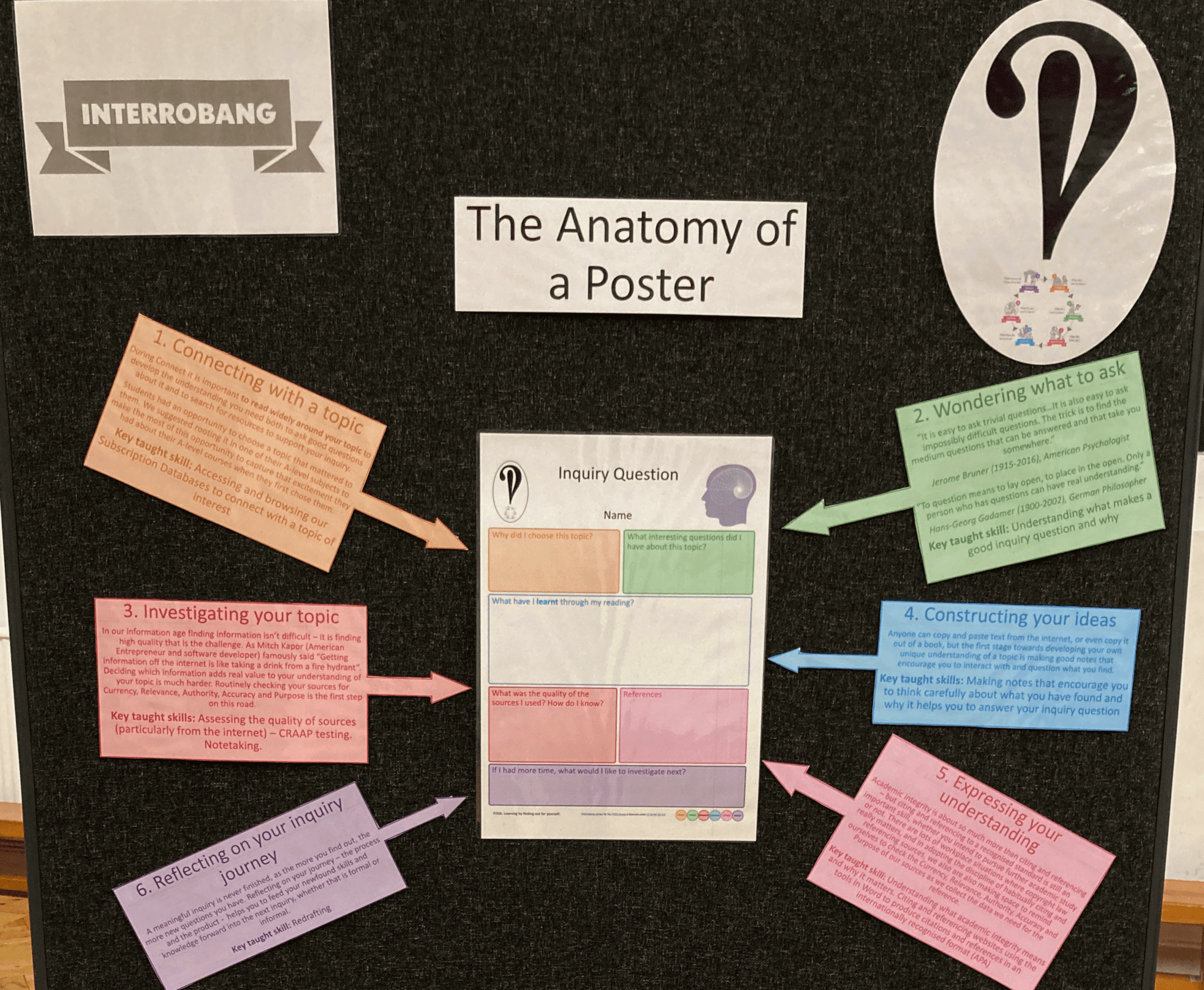 We did look at the use students had made of the Construct side of their investigative journals and discussed the difference between making notes directly from a source and then interpreting and commenting on those notes in the light of your question. We then spent most of this session working on their posters for the Interrobang evening. I gave everyone the same format (although they could decide whether to use a single sheet of A3 or to spread their work over two) so that the focus would be on the content not on poster design. The posters were supposed to showcase the different skills they had learnt at each stage – as you can see from this ‘Anatomy of a poster’ display that I made as part of the celebration evening.
We did look at the use students had made of the Construct side of their investigative journals and discussed the difference between making notes directly from a source and then interpreting and commenting on those notes in the light of your question. We then spent most of this session working on their posters for the Interrobang evening. I gave everyone the same format (although they could decide whether to use a single sheet of A3 or to spread their work over two) so that the focus would be on the content not on poster design. The posters were supposed to showcase the different skills they had learnt at each stage – as you can see from this ‘Anatomy of a poster’ display that I made as part of the celebration evening.For homework students completed their posters, using either just slide 1 or both slide 2 and slide 3 from this template. It is interesting to note that all of the four students who chose to use the two slide poster decided to continue on to do an EPQ after the interrobang course was finished (along with just one other student who chose the single slide poster).
Focus skills for this session:
- Construct: Develops own opinion, perspective, or claim and supports with evidence and a clear line of reasoning
- Express: Publishes final product for an authentic audience and real-world application [poster presentation for peers, parents, staff and governors]
25th February 2023 at 5:22 pm #79696Session 6: Best foot forward
The focus of this session was improving and refining posters for the celebration evening. There is no presentation – in part because we focussed on peer review. I wanted to give students time to look at each others posters (and at my comments) and to make suggestions to each other and act on them. But also in part because this turned out to be a very small session, with over half the group out on a school trip.
There were some excellent posters, really showcasing the skills that they had learnt. A selection of the topics are given below, showing real diversity of interests (although quite a large cluster of interesting Physics topics for such a small group).
- Can mental illnesses be used as excuses for violence in society?
- How has the critique of Shakespeare evolved?
- Ethics of taking photos of people in public
- The impact of the civil rights movement in America
- How have things in Catholicism changed?
- The history and legality of street art
- How good can telescopes get?
- Can anything travel faster than light?
- How will we live on mars and the moon, and how will this benefit the human race?
- What are quarks and how do we know they exist?
The two in bold have now evolved into exciting EPQ topics. My other three EPQ students this year chose to switch topics (from the other three topics in italics) after the interrobang course and have moved on to: the ethics of microtransactions in video games; the politicisation of archaeology in Israel; and whether Secular Buddhism is really a Buddhist sect.
Focus skills for this session:
- Reflect: Records and reflects on individual experience of the inquiry process – the hardest part, best part, important skills learned, insights experienced, emotional highs and lows, etc. – with suggestions to self about specific ways to improve in the future
- Reflect: Identifies own strengths (academic, social, and emotional) and sets goals about specific ways to improve in the future
25th February 2023 at 6:07 pm #79698Celebration evening
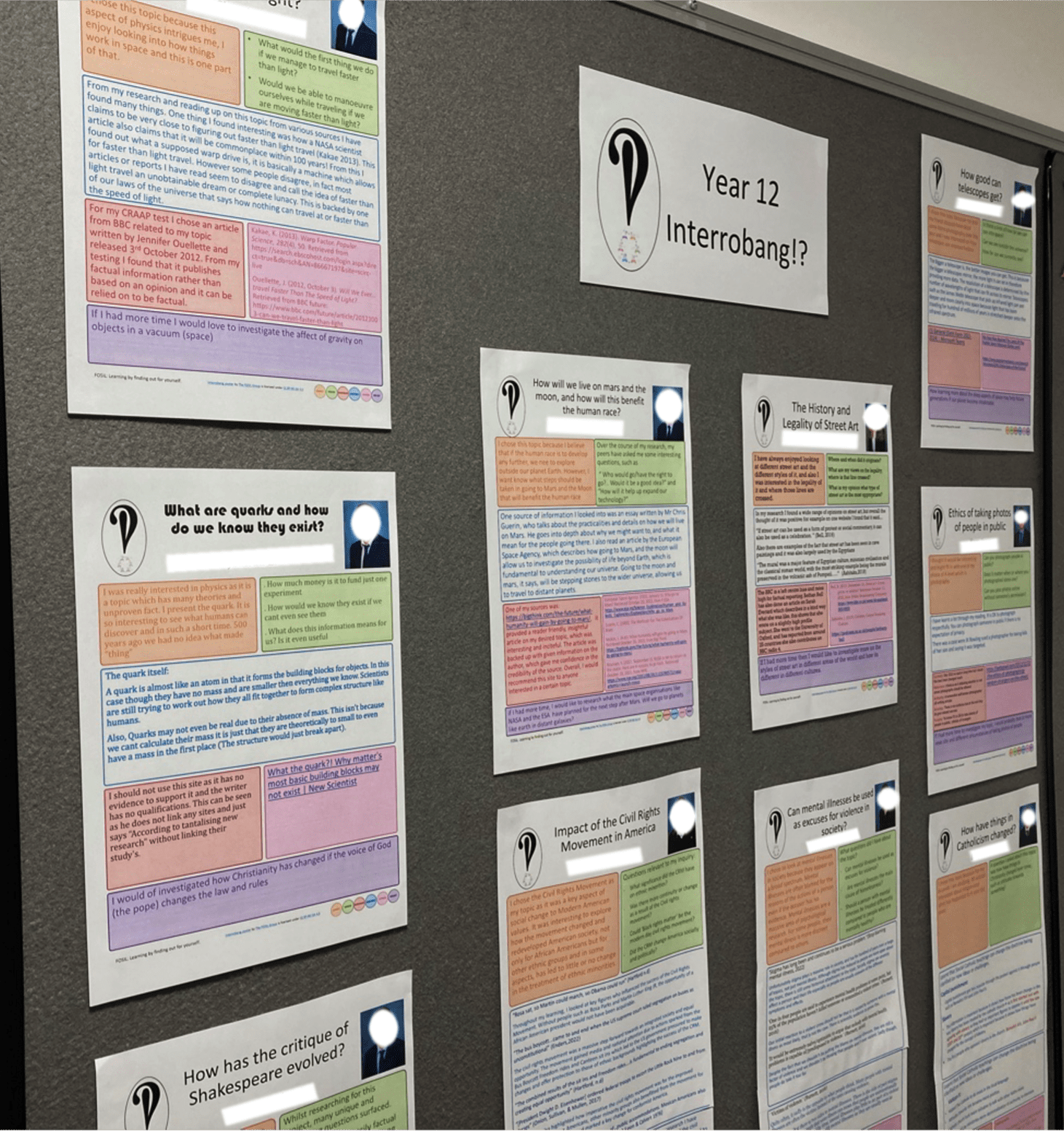 The celebration evening was amazing and, again, I want to share the school newsletter article with you (with names redacted) because I want to emphasise the importance of this kind of advocacy. It was a huge event for the Library and had a real impact on our profile, the profile of the Sixth Form within the school (which is only in its third year – until September 2020 our school ended at age 16 and students wanting to study for their final two years had to move to a different school), and the profile of the EPQ within the Sixth Form.
The celebration evening was amazing and, again, I want to share the school newsletter article with you (with names redacted) because I want to emphasise the importance of this kind of advocacy. It was a huge event for the Library and had a real impact on our profile, the profile of the Sixth Form within the school (which is only in its third year – until September 2020 our school ended at age 16 and students wanting to study for their final two years had to move to a different school), and the profile of the EPQ within the Sixth Form.We combined the poster presentations for the Year 12 Interrobang course (which were very informal – students stood by their posters and the audience circulated round to talk to them about their work) with the formal assessed presentations for our two Year 13 EPQ students. Year 12 and 13 parents, and Year 11 students and parents (who were in the process of making the decision about whether to stay with us for Sixth Form or possibly to move elsewhere) were all invited, along with staff and school trustees (elsewhere these might be known as the governors or the school board). So it functioned as a formal exam assessment, a celebration AND a marketing event (on a number of different fronts!).
I’d love to share photos of the evening too because it was very special, but I can’t share photos of our students here. I have included a photo of the poster display we made in the Library afterwards (with names and photos redacted).
_____________________________________________________________
Newsletter article:
Thursday evening saw another of Blanchelande’s Sixth Form firsts – our first Sixth Form Inquiry Celebration Evening. This exciting and inspiring event saw our Year 13 Extended Projected Qualification students, HR and EK, expertly presenting on their findings and reflections on their year long Extended Project Qualification inquiry journey, as well as Year 12 enthusiastically discussing their Interrobang!? posters with parents, staff, trustees and students. It was an amazing celebration of all the students’ unique interests and journeys, and many of the audience commented on the very wide range of fascinating topics that they had chosen.
HR and EK set the tone at the start of the evening, with their confident and assured presentations. HR dazzled us with her understanding of Kant and Hume as she explored the complex question of the compatibility between free will and determinism, while EK intrigued us with his fascinating exploration of the reasonableness of a variety of competing explanations for Moses’ burning bush experience as he demonstrated a mature ability to sift out the most reputable sources in a topic rife with pseudoscience.
After that, we had the opportunity to view the excellent posters that Year 12 created in their six-week Interrobang!? inquiry course and to chat with them about their experiences of the course. They had produced some very high-quality work in just 3 hours of teaching and 3 hours of independent time, and learnt some important new skills along the way. Prizes were awarded to:
- First prize: EF (Impact of the civil rights movement in America)
- Second prize: CO (Can mental illnesses be used as excuses for violence in society?)
- Third prize: TB (How has the critique of Shakespeare evolved?)
- Most progress: BV (How have things in Catholicism changed?)
Special mention also has to go to HJ for making a special effort to come to exhibit his poster (Ethics of taking photographs in public) despite having had a foot operation the day before.
We are passionate about inquiry because we recognise how it transforms students’ educational journeys – and I know all who attended last night were bowled over by the powerful evidence they saw of this.
_______________________________________________________________
It was an amazing evening and we had some wonderful comments from those who attended. One very senior member of staff wrote to me afterwards that “After an evening meeting the night before and a fairly tough week I can’t say that I was chomping at the bit to come back in for a two hour session, but I enjoyed every minute of the evening – indeed, it revived me. The level of fluency and the confidence the structure and formation you provide the students with really does transform their capacity for learning” and another said that in all his years in education he had never seen anything as astonishing as the expertise and confidence displayed by our EPQ students in their presentations. We also had some super feedback from parents who attended. It definitely worked as an advocacy and marketing tool but, much more importantly, it also made all the students involved feel that they had been part of something really special.
25th February 2023 at 6:14 pm #79699Impact on the Extended project Qualification
With my other hat on, as EPQ co-ordinator, the Interrobang course meant that those who opted into the EPQ (immediately after the Interrobang course ended) had a much clearer sense of what they were opting into. The early dropout rate was much lower for a start – indeed, no-one has yet dropped out this year, 4 months in, whereas last year we lost almost a third in the first few weeks as those who came to the initial ‘taster’ sessions realised it wasn’t for them. Also, which was much more difficult to manage, last year we had three students try to opt in after the course had already started and in some cases had been running for several months. Although I gave them considerable support to get up to speed, none of these late opt-ins eventually finished the course. This year’s group seems much more stable and most of them settled on a broad topic relatively quickly, giving them much more time to refine it before submitting their Candidate Proposal. They are also starting from a higher skill level, making it possible to develop those skills even further.
Finally, I think it has encouraged a much wider range of students to pursue this opportunity. While it is necessary for students to be able to balance an extra 90 hour workload with their other A-level subjects, the EPQ is not intended to be only for the ‘top’ students (however that is defined), and I firmly believe that it can be a life transforming experience for anyone (as long as they have the passion to pursue their interest – I don’t think it would be a good idea for us to make it compulsory although I know a number of schools do). My cohort this year includes a number of students with a range of different Special Educational Needs (including significant dyslexia and processing speed issues) who I am not sure would have necessarily chosen the EPQ without the experience of the preceding Interrobang course and who are really flourishing and benefitting from the skills they are learning.
For anyone interested in discussing or investigating the EPQ further, there is a forum topic here
If you have any comments, questions or suggestions about inquiry/induction courses at Year 12/Grade 11 level please do comment below. We are always looking to improve our provision year-on-year and have so much still to learn.
-
AuthorPosts
- You must be logged in to reply to this topic.


